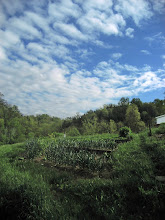This Saturday was the first day we brought strawberries to the market. We had a modest but significant harvest (about 14 quarts). We priced them at $4 a pint and $6 a quart, which is a dollar above our other vendor-farmers, who get $3 or $5 for conventionally grown berries. At the beginning of market, a fellow farmer admired our berries, and assured me that asking for more for organic was a good thing to try. It worked well, and we were out of berries before market was halfway over.
We also brought some wild-harvested oyster mushrooms. It has been so rainy this spring, and there have been many days when it was too wet to do anything in the fields. This is the perfect time to go be in our forests, admiring the spring flushes of fungi, and carefully collecting edibles. I was happy to find a massive sycamore stump that was loaded with oyster mushrooms near the bank of the Kentucky River. The mushrooms were brought to market, and several pounds are bound for the dinner plate tonight in Frankfort and the surrounding area. It feels nice to share the bounty.
We had to change one of our signs at market this week, due to the wild-harvested mushrooms. One of our market signs says "Everything's Organic", which has been true until today. The mushrooms are not certified organic, so we had to take down the "Everything's Organic" sign and label the mushrooms as "wild". In order to market mushrooms as organic, a farmer/harvester can abide by the reasonable rules laid out in this document, which I find very interesting:
As a summary to the article above...in order to say our wild-harvested mushrooms are organic, we must submit a process of harvesting to our certifier, the Kentucky Department of Agriculture, and it must show that we are enhancing the natural system where the mushrooms are found. I'm impressed by this area of the organic standards, and I find it inspiring. It is another reason why I like to participate in the National Organic Program (NOP). I understand that the rules have many limits and sometimes are abused, but in so many cases, they are so entirely useful. Wild harvesting is just the latest area I have discovered where they are useful, because they really do have ecosystem health in mind.
The NOP is also very useful when it comes to seeds. No genetically engineered seeds are allowed in organic production; the organic seed market is a powerful mode of protecting strains of seeds from genetically modified genes. Another way seed users benefit from the NOP: Seeds that are kept within the evolution of organic farms pass on the traits of thriving within a biodiverse and natural ecosystem, not traits of doing well with generous applications of synthetic chemicals. I'll write more about organic seed production as the season goes on. . .for now, it is Saturday afternoon, I have returned from market, and I slept very little last night. Naptime.



